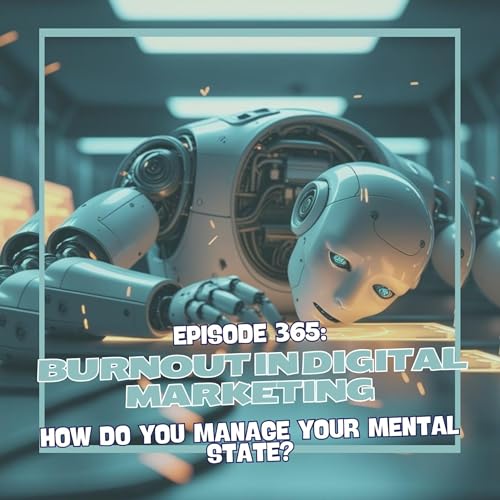
Episode 365: Burnout in Digital Marketing - How Do You Manage Your Mental State?
Échec de l'ajout au panier.
Échec de l'ajout à la liste d'envies.
Échec de la suppression de la liste d’envies.
Échec du suivi du balado
Ne plus suivre le balado a échoué
-
Narrateur(s):
-
Auteur(s):
À propos de cet audio
In this deeply personal episode, Alex opens up about experiencing burnout as a solo entrepreneur in digital marketing and AI, sharing the three core areas he's identified as contributing factors and asking for community input on overcoming these challenges.
Keywords
Entrepreneur Burnout, Digital Marketing Burnout, Solo Entrepreneur Challenges, Work Life Balance, Financial Stress, Time Management, Lifestyle Management, Small Business Mental Health, Freelancer Burnout, Personal Burnout Recovery
Key Takeaways
Episode Context
- Longest break yet between podcast recordings due to host burnout
- Personal recharge time spent in northern Michigan on the lake
- Honest admission that this isn't the first time experiencing burnout
- Decision to share raw, personal aspects despite potential brand risk
The Core Question
- "How do other solo entrepreneurs or solo freelancers, leaders of small teams combat the burnout that comes with the incredible pace and nature of the shifting landscape that is digital marketing and now AI marketing?"
- Recognition that personal aspects contribute equally to burnout as professional aspects
- Seeking community conversation and solidarity rather than providing solutions
Three Core Burnout Pillars
1. Time Management / Work-Life Balance
- Challenge of compartmentalizing priorities: family first, work second, personal wellbeing third
- Difficulty balancing family time with business growth demands
- Strict scheduling approach: set morning self-care time, defined work hours, sacred family time (5-8pm)
- Late night work dilemma: 9pm-midnight or later to grow business
- Key question: "Are these hours actually required, or is this workload leading to burnout?"
2. Financial Management and Money Stress
- Admission of struggling with money management throughout adult life
- Financial anxiety contributing to mental fatigue and burnout
- Need for deliberate spending decisions for both business and personal expenses
- Importance of realistic long-term income/expense projections
- Commitment to sticking to budgets despite difficulty
3. Lifestyle Management
- Managing personal vices that creep into daily life
- Examples: end-of-day cocktails, snack breaks, other comfort habits
- Vices becoming "finish lines" instead of long-term goals
- Need to prioritize family future, business security over immediate gratification
- Recognition that boring but important things must take precedence
Time Management Solutions
- Well-organized, well-structured daily calendar
- True commitment to routine and discipline
- Routine leading to more personal freedom long-term
- Compartmentalization of priorities without overlap
- Multiple job juggling challenges (9-5 plus freelancing)
The Sacrifice vs. Burnout Dilemma
- Belief that envisioned success requires sacrifice and long hours
- Question whether late-night work is necessary or harmful
- Exploration of optimizing other life areas to compensate
- Recognition that both professional and personal aspects contribute equally
Community Engagement Request
- Explicit ask for listener feedback and conversation
- Interest in hearing others' burnout experiences and solutions
- Request for time management and financial management strategies
- Desire for input on tackling vices and negative lifestyle cycles
Personal Vulnerability
- Admission of being "almost too proud to say" but sharing anyway
- Recognition that many others struggle with similar issues
- Emphasis on solidarity and community support
- Breaking down stigma around entrepreneur mental health
Routine as Freedom Philosophy
- Discipline and routine leading to more personal freedom
- Structure providing clarity rather than restriction
- Importance of consistency in daily patterns
- Balance between rigidity and flexibility
The Reality CheckBurnout in solo entrepreneurship isn't just about work overload - it's a complex intersection of time management, financial stress, and lifestyle choices that require honest self-assessment and community support to address effectively.


